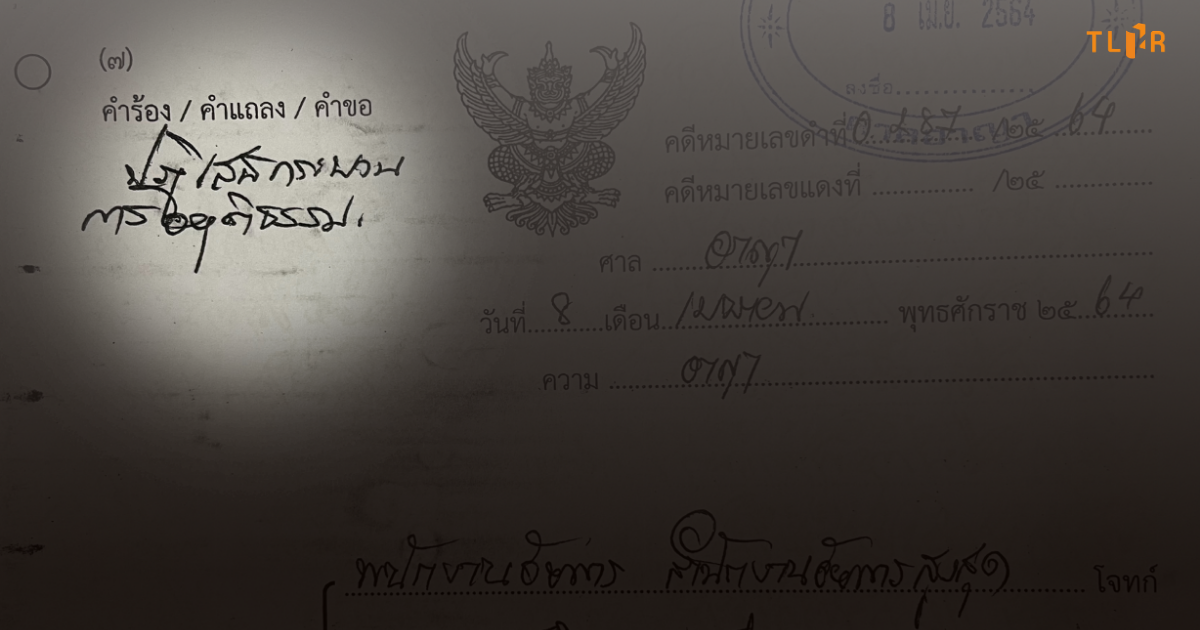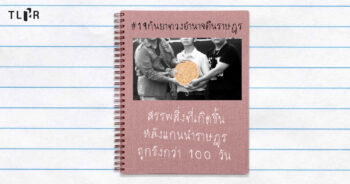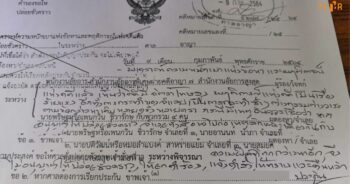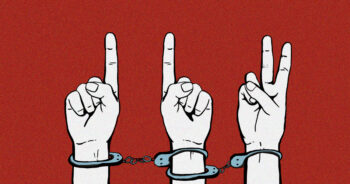On 8 April 2021, a hearing to examine the evidence in the case of the #19 September Return Power to the People protest was held in Room 704 at the Criminal Court on Ratchadaphisek Road. The protest in question was held on 19- 20 September 2020 on the Tha Prajan campus of Thammasat University and Sanam Luang. A total of 22 defendants face a range of of accusations, including 7 leaders being prosecuted for alleged lese majeste under Article 112 of the Criminal Code. Despite making repeated requests, none of the 7 have been granted bail.
In the courtroom, there were 13 defendants who have been accused of violation of Article 116 [sedition], including Chinnawat Chankrachan, Nawan Liengwattana, Nattaphat Akhad, Thongchai Uaracha, Thanop Ampawat, Thani Sasom, Phattaraphong Noiphang, Sitthithat Chindarat, Suwannee Tallek, Anurak Jeantawanich, Natchanon Phairoj, “Khru Yai” Atthapol Buaphat, and Adisak Sombatkham.
At approximately 10:30 am, prison officials brought the other 9 defendants, who are being held at various prisons, into the courtroom. This included “Rung” Panusaya Sithijirawattanakul, from the Central Women’s Prison; “Penguin” Parit Chiwarak, Arnon Numpa, “Mor Lam Bank” Patiwat Saraiyaem, Somyot Prueksakasemsuk, “Mike” Panupong Jadnok, “Pai” Jatupat Boonpattararaksa, and “Justin” Chukiat Saengwong from Bangkok Remand Prison; and “Ammy” Chaiamorn Keawwiboonphan from Thonburi Remand Prison.
Family Banned from the Courtroom, No Order For Secret Examination
A registration table was set up in the area across from Krungthai Bank within the court complex in the morning; such a registration table has been set up each time there is a hearing in the #19 September Return Power to the People case. Those who are going to enter Room 704 were registered separately. Their names and ID card numbers were written down and name tags with this information were distributed.
During the most recent hearing to examine evidence, held on 29 March, each detainee was permitted to have 2 relatives enter the courtroom and listen to the hearing. The relatives were given purple cards. But on 7-8 April, when hearings to examine new evidence were held, court police in the area of the registration table informed the families of detainees that the court had ordered that they must go wait in the arraignment room on the lower level of the court. Despite this order banning the families from entering the courtroom, there was no order issued to examine the case in secret.
The atmosphere on the morning of 7 and 8 April was full of confusion on the part of the families of the detainees who had traveled to the court. Some of the mothers were in tears and worried that if they were not allowed in to listen today, they would not be allowed in to listen for the entirety of the trial.
On the morning of 8 April, all of the relatives were initially forbidden from even entering the court building. There were court police who guarded the stairs and offered reasons why the families of the detainees should not go up to the 7th floor. It would be a waste of their time. They did not have permission to enter the courtroom and so going up to wait would be a waste of time. The officials informed the relatives that they had to go wait in the arraignment room. Some of the relatives sat down on the stairs of the court in order to express their disagreement with this request for their compliance.
After a significant period of time passed, the relatives were then able to pass through the door of the court and go up to wait on the 7th floor. The mother of “Mike” Panupong arrived later at 10:45 am and so did not go up along with the others. She had to wait on the steps of the court while security guards used their walkie-talkies to ask for permission for her to use the lift to go up to the 7th floor. She brought eyeglasses for her son, but the court police informed her that she could not give them to him. She would have to go to the prison and send them inside through the prison officials.
On the 7th floor, the women’s bathroom was closed, just as it had been on 29 March. Only the officials who worked at the court were permitted to go inside. Three layers of yellow metal fencing closed off the rest of the floor from the area by the lift. One security guard commented that, “We have brought the thickest fencing we have to close off this floor.”
Court police, court officials, and security guards patrolled and kept order inside and outside the courtroom. Some of the relatives sat down on the floor near the lift while others stood. There was a room with chairs and air-conditioning nearby, but permission was not granted for them to enter as that room was accessed by the same hallway as Room 704.
On 7 April, the area under the court was closed and food could not be bought for the detainees. Defendants were not allowed to go downstairs to eat, and instead officials bought food and drinks upstairs to be eaten in the courtroom. They cited COVID as the reason; the examination of evidence continued without a break. On 8 April, the defendants were taken downstairs to eat, but their families were not allowed to buy food for them.
21 Defendants Declare Withdrawal of Legal Representation Due to Denial of the Right to Confer With Their Lawyers
After the completion of the examination of evidence in the case on 8 April, 22 of the defendants (all except Patiwat Saraiyaem, Defendant No. 3) declared their intention to withdraw legal representation. They did so as the examination in this trial has taken place with regulations and practices that do not facilitate a fair trial for the defendants according to the principles and intention of the law. The reasons are as follows:
1. The defendants did not have the right to individual and confidential conferral with their lawyers. Prison officials controlled defendants and lawyers and issued measures under the banner of safety until the rights of both were violated, even within the courtroom.
This has included strictly checking the names of the lawyers of defendants and defendants who are part of each hearing, assaulting lawyers who exercise the right to confer with the defendants individually, seizing the lawyers’ telephones, and not allowing the defendants to confer individually with their lawyers.
Anon Numpa and Jatupat Boonpattararaksa requested that the court, which has authority over the trial, order the prison officials to act and respect the aforementioned rights. The court responded that it would do as it judged appropriate and then did not order the prison officials to act with respect to the defendants or the lawyers.
2.The defendants who are detained and the defendants who have received bail have not had the right to confer with one another about the case. They were not permitted to converse even adequately.
3. The court has not ordered for this case to be examined in secret. Yet various orders and measures banning the families of the defendants and other outside individuals from observing the proceedings have been made. The defendants and lawyers declared to the court that this is in contravention to the principles of an open and transparent trial, but the court did not take up this issue for consideration.
Therefore all of the defendants, with the exception of Patiwat, requested to withdraw their legal representation and the lawyers requested that they be released of their duties. The defendants and the lawyers are unable to accept this trial because it does not take the rights of the defendants into account.
But today [8 April 2021], the court did not issue an order about this petition to withdraw legal representation.
Arnon Declares Refusal of the Judicial Process, The Courtroom Has Been Made Into a Prison
In addition, Arnon Numpa wrote a declaration to the court in the case entitled “Declaration of Refusal of the Judicial Process.” The declaration contained the following content:
“The court met to examine evidence today. Defendant No. 2 would like to withdraw all legal representation because there cannot be a fair trial for the following reasons:
- Since the defendant was indicted, he has been denied the right to bail during his trial. He has been treated in various ways that degrade his human dignity. Even though the defendant is presumed to be innocent under the law, the judicial process has refused him justice from the very beginning simply because he has been accused of violating Article 112. He has been caged like an animal and denied the opportunity for bail. It is as though the judgment has been rendered in advance.
The judicial process — which can be a pillar of society when it is carried out fairly — loses itself completely upon encountering Article 112. It allows itself to be guided by those outside the judicial process who hold power. The judicial process is carried out with fear and without taking human dignity into account. If the defendant continues to participate in such a process, it will mean that he is supporting an abnormal process and he cannot accept this.
- The effect of detaining people in order to force them to accept guilt and using detention to crucify defendants in the name of the law to destroy the struggle for what is right will be to freeze society in darkness and fear. No one will dare to speak the truth frankly to find a solution for society. The defendant, as a person who studied the law, cannot accept the disgrace of everything that has been done in the name of the law.
- The sharp, new paradigm contained in the demands of the next generation has enlightened society until the ears of the old guard are ringing. But it is the truth. We need the old guard to courageously accept it, open their hearts, and converse civilly. But instead, the old guard has used the law to shut people’s mouths. They have leveled charges and are prosecuting their children and grandchildren. They have used force and suppressed protests with violence, including beating protestors and using chemical-laced water to attack youth in cold blood. Is this what people who share a country call “unity” and “reconciliation”?
- In this trial, our right to fully fight the case has been violated. The courtroom has been made into a prison. Our lawyers have been pressured and restricted from performing their duties. This is an unconstitutional process. The defendants and the lawyers met and agreed that if we participate in this process, we will only be creating a malformed norm and further promoting a process of injustice.
- In the course of the examination of the request for bail, the defendant heard news that the Supreme Court intervened in the decision about the request. The defendant would like to request that the court send this matter to the Office of the Judicial Commission for examination of whether or not this has grounds. If an external person can order the court to take action, this is significant, and significant for the integrity of the court itself.
- This case has involved the destruction of human dignity, the use of the law to silence people, and many other forms of injustice. As a person who studied the law and who earns a living as a lawyer, and as a citizen who aims to reform the monarchy, the defendant cannot continue to participate in this process. The defendant whose name is at the end of this petition therefore requests to withdraw legal representation and refuse this process.”
The court has set the witness hearings for this case to be held between May and December 2021. The first set of hearings will be held 19-21 May 2021.



